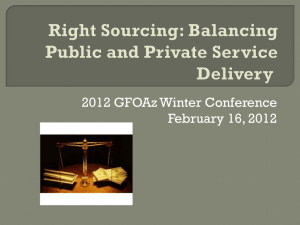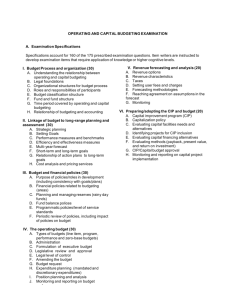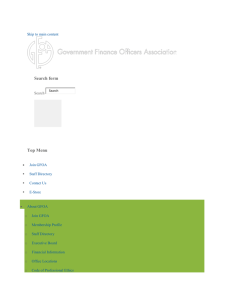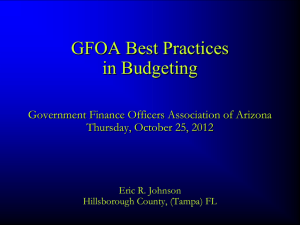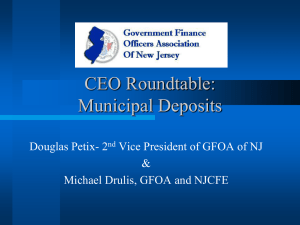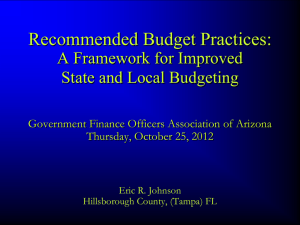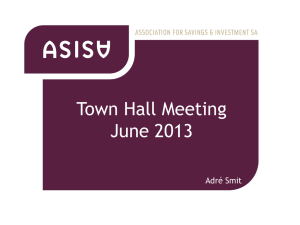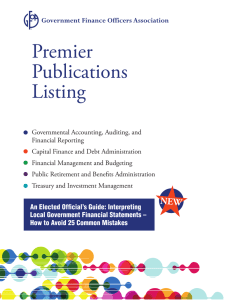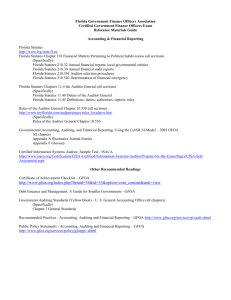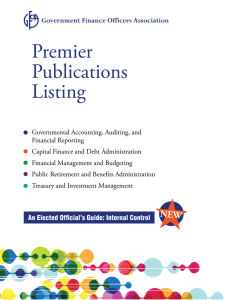WA Update - March 2015 - Government Finance Officers Association
advertisement
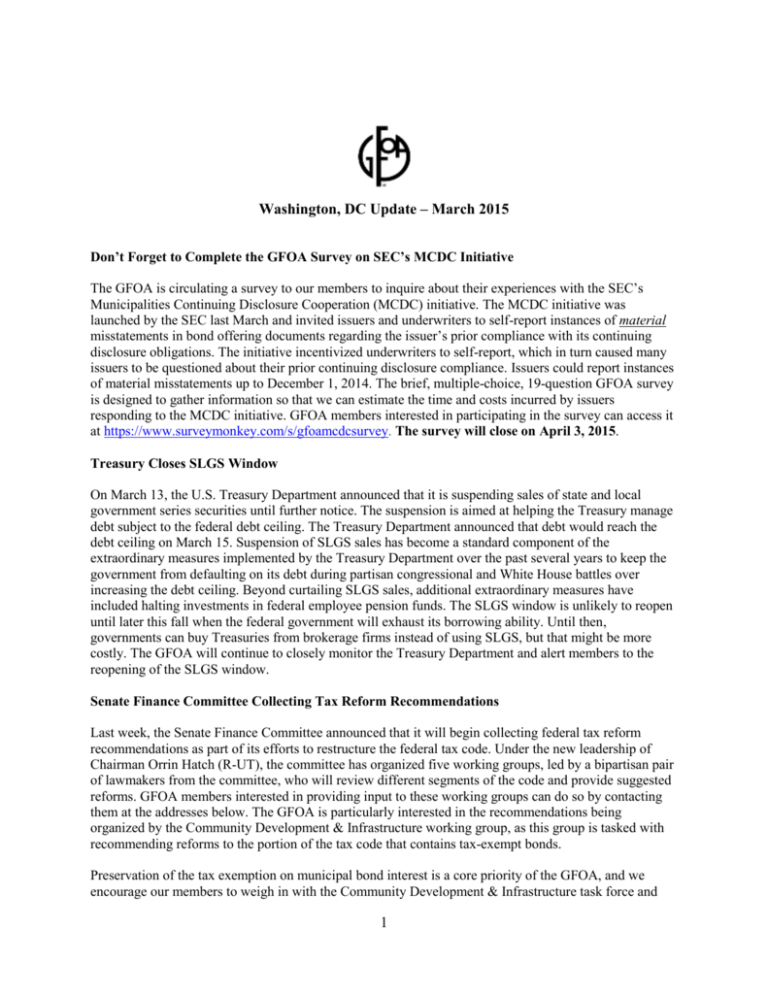
Washington, DC Update – March 2015 Don’t Forget to Complete the GFOA Survey on SEC’s MCDC Initiative The GFOA is circulating a survey to our members to inquire about their experiences with the SEC’s Municipalities Continuing Disclosure Cooperation (MCDC) initiative. The MCDC initiative was launched by the SEC last March and invited issuers and underwriters to self-report instances of material misstatements in bond offering documents regarding the issuer’s prior compliance with its continuing disclosure obligations. The initiative incentivized underwriters to self-report, which in turn caused many issuers to be questioned about their prior continuing disclosure compliance. Issuers could report instances of material misstatements up to December 1, 2014. The brief, multiple-choice, 19-question GFOA survey is designed to gather information so that we can estimate the time and costs incurred by issuers responding to the MCDC initiative. GFOA members interested in participating in the survey can access it at https://www.surveymonkey.com/s/gfoamcdcsurvey. The survey will close on April 3, 2015. Treasury Closes SLGS Window On March 13, the U.S. Treasury Department announced that it is suspending sales of state and local government series securities until further notice. The suspension is aimed at helping the Treasury manage debt subject to the federal debt ceiling. The Treasury Department announced that debt would reach the debt ceiling on March 15. Suspension of SLGS sales has become a standard component of the extraordinary measures implemented by the Treasury Department over the past several years to keep the government from defaulting on its debt during partisan congressional and White House battles over increasing the debt ceiling. Beyond curtailing SLGS sales, additional extraordinary measures have included halting investments in federal employee pension funds. The SLGS window is unlikely to reopen until later this fall when the federal government will exhaust its borrowing ability. Until then, governments can buy Treasuries from brokerage firms instead of using SLGS, but that might be more costly. The GFOA will continue to closely monitor the Treasury Department and alert members to the reopening of the SLGS window. Senate Finance Committee Collecting Tax Reform Recommendations Last week, the Senate Finance Committee announced that it will begin collecting federal tax reform recommendations as part of its efforts to restructure the federal tax code. Under the new leadership of Chairman Orrin Hatch (R-UT), the committee has organized five working groups, led by a bipartisan pair of lawmakers from the committee, who will review different segments of the code and provide suggested reforms. GFOA members interested in providing input to these working groups can do so by contacting them at the addresses below. The GFOA is particularly interested in the recommendations being organized by the Community Development & Infrastructure working group, as this group is tasked with recommending reforms to the portion of the tax code that contains tax-exempt bonds. Preservation of the tax exemption on municipal bond interest is a core priority of the GFOA, and we encourage our members to weigh in with the Community Development & Infrastructure task force and 1 discuss the importance of maintaining this critical infrastructure financing tool. GFOA members can access draft advocacy letters and talking points to use in this outreach at GFOA’s Tax Exemption Resource Center. The deadline for comments is April 15. All submissions must be saved as pdf files and e-mailed as attachments to the appropriate groups. Use the name of the submitting organization or individual submitting the comment. Make sure to list the name of the tax working group you are contacting in the subject line of the e-mail, and include the contact name, organization (if the submission is being submitted on behalf of a group), phone number, and e-mail address of the submitter, in the body of the e-mail. Individual Income Tax - Individual@finance.senate.gov Business Income Tax - Business@finance.senate.gov Savings & Investment - Savings@finance.senate.gov International Tax - International@finance.senate.gov Community Development & Infrastructure - CommunityDevelopment@finance.senate.gov Supreme Court Justice Kennedy Weighs In on Online Sales Tax Legislation On March 3, 2015, Supreme Court Justice Anthony Kennedy invited a legal challenge over whether states can require out-of-state and online retailers to collect sales taxes. Justice Kennedy’s opinion was issued as part of the Supreme Court’s unanimous ruling in the case of Direct Marketing Association v. Brohl. Justice Kennedy’s comments reveal the Court’s awareness of the need for federal intervention to enable states to collect e-commerce taxes. In his opinion, Kennedy added that he believes that the Quill and National Bellas Hess decisions establishing the physical presence rule for sales tax are “now inflicting extreme harm and unfairness on the States.” Justice Kennedy cited the growth of Internet commerce, the reality of business presence even in the absence of physical presence, and his view that “it is unwise to delay any longer a reconsideration of the Court’s holding in Quill….The legal system should find an appropriate case for this Court to reexamine Quill and Bellas Hess.” Background on the Quill and Bellas Hess cases is available here. Kennedy’s opinion comes as federal lawmakers face a stalemate on legislation that would allow states to enforce sales taxes on remote online vendors. Though a bipartisan group of Senators reintroduced legislation (see press release here) this week that would enable state collection of e-commerce taxes, and the House is also discussing a legislative path forward on this issue, significant disagreement over the contents of these bills still remains. In the face of these obstacles, the GFOA and our state and local association partners continue our work to meet with congressional offices to build support for enacting online sales tax legislation this year. As this campaign continues, we will continue to keep GFOA members informed on the status of these discussions and, where appropriate, engage our members to weigh in directly with their federal elected leaders in this campaign. 2
